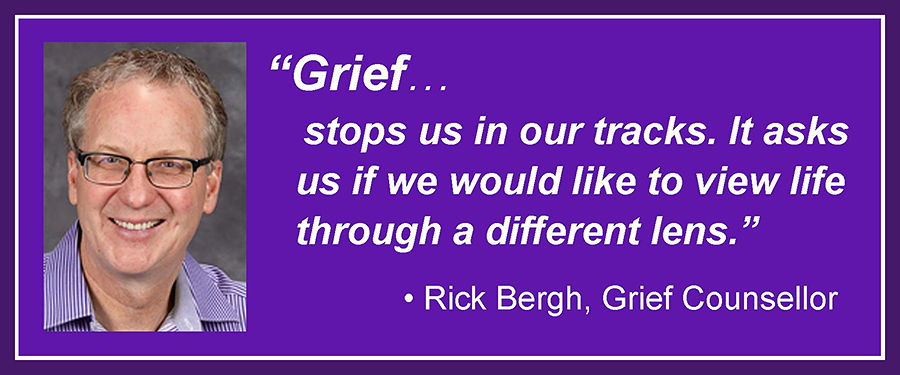Everywhere we turn since Covid-19 entered the scene we are witnessing grief – grief over the loss of life, grief over the loss of lifestyle. Reflecting on this, I knew I had to connect with our longtime coffee companion Rick Bergh, a thanatologist, bereavement educator and narrative therapist whose focus is grief and loss.
The former pastor of St. Peter’s Lutheran Church in Cochrane did not disappoint. He sent us the following email on meaning-making in the face of Covid-19.
In grief, you likely spend most of your time and energy in one of two places: the past or the future, toggling between them. But the challenge is always to stay present and live in the moment.
Grief is your reaction to what you miss that you no longer have that used to be. Grief is your reaction to what you miss that you never had but always hoped for.
Here’s the bottom line: grief is missing. And right now, the world is grieving many losses as a result of COVID -19. We’re missing. Hugs, meals shared, a caress on the cheek, family celebrations, AA meetings, rough housing with grandkids, a pint with a friend, an early morning visit to our favourite coffee shop. Maybe we’re missing someone – we couldn’t meet together as family to grieve that loss at their funeral. They disappeared, seemingly unnoticed, but we carry the unfinished sadness in our heart.
So we’re sad. Sad in the moment and anxious about the future.
We look back and we miss. We look forward and we worry.
We don’t know how things are going to turn out or what is next. Is this the new normal? And we reel under the staggering truth that it might well be.
That’s perhaps the most obvious response to COVID-19 – struggling to live in the moment. But I believe that something else is happening to us human beings as a result of this pandemic. Because we don’t know what the future holds, we are forced to take in each day, each moment. For the most part, time constraints and deadlines aren’t nipping at our heels. Expectations have slackened and “slow food” is replacing the “eat-on-the-run” culture we’ve created for ourselves.
What might we do in our day that we have not had the opportunity to do in the past?
This is what grief does. It stops us in our tracks. It asks us if we would like to view life through a different lens.
There are many healthy interventions you can add to your life to help reduce the cortisol levels (that are coursing through our bodies in these uncertain and anxious times). But I propose two things in particular that I believe will help you: gratitude and meaning-making.
Ask yourself this question: “What do I have in my life for which to be thankful?” List them. Whatever is good. However small it may seem. List it. Resist the urge to get waylaid in what you don’t have or wish you had. Only the good things. You’ll likely need another sheet of paper – or two. Just list them.
The second is this: “What am I seeing in my life that might help me to live differently and on purpose? What resources do I have, within and without, that will help me make a needed and lasting change?”
Your life will never be the same after COVID-19. Never.
But perhaps, someday, you will see not so much what you lost, but what you gained. What might bring that lasting change? I wonder what different will look like for you.
— Rick Bergh, Grief Counsellor
Thanks, Rick.

